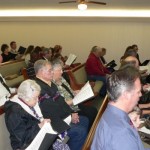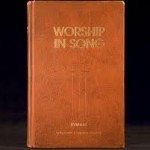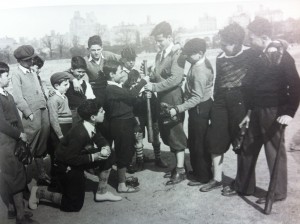A medley is a collection of songs that are typically in the same key signature, with special attention given to the words. The stronger, more consistent the message the more inspirational and encouraging the medley. When a singing group presents a medley of songs the audience, the listeners, are usually inspired by the message of the songs. But should we (can we) sing a medley of songs during our worship services? For years I can remember our song service when the song leader (at times that was me) would stand in front of the congregation and announce the song number. After allowing plenty of time to ‘turn in your song book’… we sang! After the song was over, the second song number was announced and the process continued. Nothing wrong with this, but as I stated previously, we must be sure we sing with understanding. So how would I, should I, lead the congregation in a medley?
 Let me give you an example of an medley we have sung in our home congregation on a Sunday morning. As services began we started with an opening prayer. Following the prayer, we sang “What a Mighty God We Serve” followed with “O Worship the King” and ending with “Doxology”. To assist in the flow of the medley, and to avoid interrupting the thought process, I recommend having the congregation turn to the songs BEFORE you start the medley. If your congregation uses a projector with a screen, you can project the songs (verses) and simply have the congregation follow your lead. With the above medley, notice how these words flow to develop the thoughts of praise…
Let me give you an example of an medley we have sung in our home congregation on a Sunday morning. As services began we started with an opening prayer. Following the prayer, we sang “What a Mighty God We Serve” followed with “O Worship the King” and ending with “Doxology”. To assist in the flow of the medley, and to avoid interrupting the thought process, I recommend having the congregation turn to the songs BEFORE you start the medley. If your congregation uses a projector with a screen, you can project the songs (verses) and simply have the congregation follow your lead. With the above medley, notice how these words flow to develop the thoughts of praise…
“What a mighty God we serve! What a mighty God we serve! Angels bow before Him, heaven and earth adore Him, what a mighty God we serve!” “O worship the King all glorious above, and gratefully sing His wonderful love. Our shield and defender the ancient of days. Pavilion and splendor and girded with praise.” “Praise God from Whom all blessing flow. Praise Him all creatures here below. Praise Him above ye heavenly host. Praise Father, Son and Holy Ghost.”
Whether you lead a song, announce a number, and lead a song…or if your congregation is receptive and able to follow the thoughts from a medley, as children of God, we must be more diligent in giving God our best when it comes to the songs we sing. It takes some time and you’ll need to work on what songs support the message, but with some time and determination you can bring the congregation to a closer understanding as we ‘sing with the Spirit’. Let me encourage you to spend time singing and thinking about the message in the songs. You will be amazed how medleys will begin to form in your mind as you sing with your heart.









